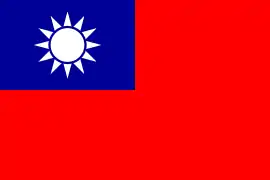Chinese Muslim Youth League
The Chinese Muslim Youth League (Chinese: 中國回教青年會; pinyin: Zhōngguó Huíjiào Qīngniánhuì) or Chinese Islamic Youth Association is an organization of Chinese Muslims in the Republic of China. It built and runs the Taipei Cultural Mosque.
中國回教青年會 | |
 | |
| Predecessor | Chinese Muslim Youth Cultural Improvement Association |
|---|---|
| Formation | 1930s |
| Founded at | Mukden, Liaoning, Republic of China |
| Headquarters | Taipei Cultural Mosque |
| Location | |
History
Chinese Muslim Youth League was established with the name Chinese Muslim Youth Cultural Improvement Association in early 1930s in Mukden during the Second Sino-Japanese War to unite Muslim young men for the war against Imperial Japanese Army and Japanese puppet state of Manchukuo.[1]
During the late 1940s of Chinese Civil War, many members of Chinese Muslim Youth Cultural Improvement Association migrated to Kwangtung Province. In July 1949 at Canton, the association reorganized themselves with other interested Muslim groups and forming the Chinese Muslim Youth Anti-Communist and Nation-Building League. Later in that year the league left Kwangtung and moved to Taiwan. In 1957, the league adopted its present name, the Chinese Muslim Youth League.[2]
Activities
The league requires formal registration of its membership. In mid-1969, it recorded 560 members, including 55 Taiwanese converts. Most of the members live in and around Taipei, and some are scattered around Taiwan.[2]
Religious identification of Chinese Muslim Youth League is often denied by the Chinese Muslim Association members who call them heretical. In the view of Muslims who live in the non-Islamic areas but intend to keep the Muslim faith, the Chinese Muslim Youth League makes too many compromises with the infidels. This principal reason is the reason for their isolation from the Islamic world.[1]
Although the organization never actively sponsor any Islamic missionary work, they still host some conversions, mostly for marriage reason.[1] In general, the league feels that they have more appeal to younger and more progressive groups. It conducts regular classes for younger people and stresses instruction in Islamic law and theology rather than in Arabic language and ceremonial concerns.[2]
See also
References
- Lin, Changkuan. "A General Survey of the Development of Islam in Taiwan". Encyclopedia of Taiwan. Ministry of Culture. Archived from the original on 23 April 2014. Retrieved 21 April 2014.
- Gowing, Peter G. (July–August 1970). "Islam in Taiwan". Saudi Aramco World. Archived from the original on 11 September 2014. Retrieved 21 April 2014.

